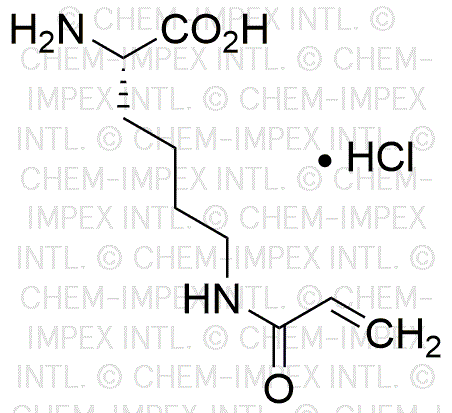Ne-Acryloyl-L-lysine hydrochloride is widely utilized in research focused on:
- Bioconjugation: This compound serves as a versatile building block for creating bioconjugates, which are essential in drug delivery systems and targeted therapies. Its ability to form stable linkages with biomolecules enhances the efficacy of therapeutic agents.
- Polymer Chemistry: It is used in the synthesis of functional polymers, particularly in the development of hydrogels. These hydrogels find applications in tissue engineering and regenerative medicine due to their biocompatibility and tunable properties.
- Diagnostics: Ne-Acryloyl-L-lysine hydrochloride can be employed in the development of diagnostic assays. Its reactivity allows for the attachment of various labels or probes, facilitating sensitive detection methods in medical diagnostics.
- Cosmetic Formulations: The compound is also explored in cosmetic science for its potential in skin care products. Its properties may enhance the stability and performance of formulations, providing benefits like improved hydration and skin barrier function.
- Research in Drug Development: Researchers utilize this chemical in the design of novel therapeutic agents. Its unique structure allows for modifications that can lead to improved pharmacological profiles, addressing challenges in drug resistance and specificity.
General Information
Properties
Safety and Regulations
Applications
Ne-Acryloyl-L-lysine hydrochloride is widely utilized in research focused on:
- Bioconjugation: This compound serves as a versatile building block for creating bioconjugates, which are essential in drug delivery systems and targeted therapies. Its ability to form stable linkages with biomolecules enhances the efficacy of therapeutic agents.
- Polymer Chemistry: It is used in the synthesis of functional polymers, particularly in the development of hydrogels. These hydrogels find applications in tissue engineering and regenerative medicine due to their biocompatibility and tunable properties.
- Diagnostics: Ne-Acryloyl-L-lysine hydrochloride can be employed in the development of diagnostic assays. Its reactivity allows for the attachment of various labels or probes, facilitating sensitive detection methods in medical diagnostics.
- Cosmetic Formulations: The compound is also explored in cosmetic science for its potential in skin care products. Its properties may enhance the stability and performance of formulations, providing benefits like improved hydration and skin barrier function.
- Research in Drug Development: Researchers utilize this chemical in the design of novel therapeutic agents. Its unique structure allows for modifications that can lead to improved pharmacological profiles, addressing challenges in drug resistance and specificity.
Documents
Safety Data Sheets (SDS)
The SDS provides comprehensive safety information on handling, storage, and disposal of the product.
Product Specification (PS)
The PS provides a comprehensive breakdown of the product’s properties, including chemical composition, physical state, purity, and storage requirements. It also details acceptable quality ranges and the product's intended applications.
Certificates of Analysis (COA)
Search for Certificates of Analysis (COA) by entering the products Lot Number. Lot and Batch Numbers can be found on a product’s label following the words ‘Lot’ or ‘Batch’.
*Catalog Number
*Lot Number
Certificates Of Origin (COO)
This COO confirms the country where the product was manufactured, and also details the materials and components used in it and whether it is derived from natural, synthetic, or other specific sources. This certificate may be required for customs, trade, and regulatory compliance.
*Catalog Number
*Lot Number
Safety Data Sheets (SDS)
The SDS provides comprehensive safety information on handling, storage, and disposal of the product.
DownloadProduct Specification (PS)
The PS provides a comprehensive breakdown of the product’s properties, including chemical composition, physical state, purity, and storage requirements. It also details acceptable quality ranges and the product's intended applications.
DownloadCertificates of Analysis (COA)
Search for Certificates of Analysis (COA) by entering the products Lot Number. Lot and Batch Numbers can be found on a product’s label following the words ‘Lot’ or ‘Batch’.
*Catalog Number
*Lot Number
Certificates Of Origin (COO)
This COO confirms the country where the product was manufactured, and also details the materials and components used in it and whether it is derived from natural, synthetic, or other specific sources. This certificate may be required for customs, trade, and regulatory compliance.


